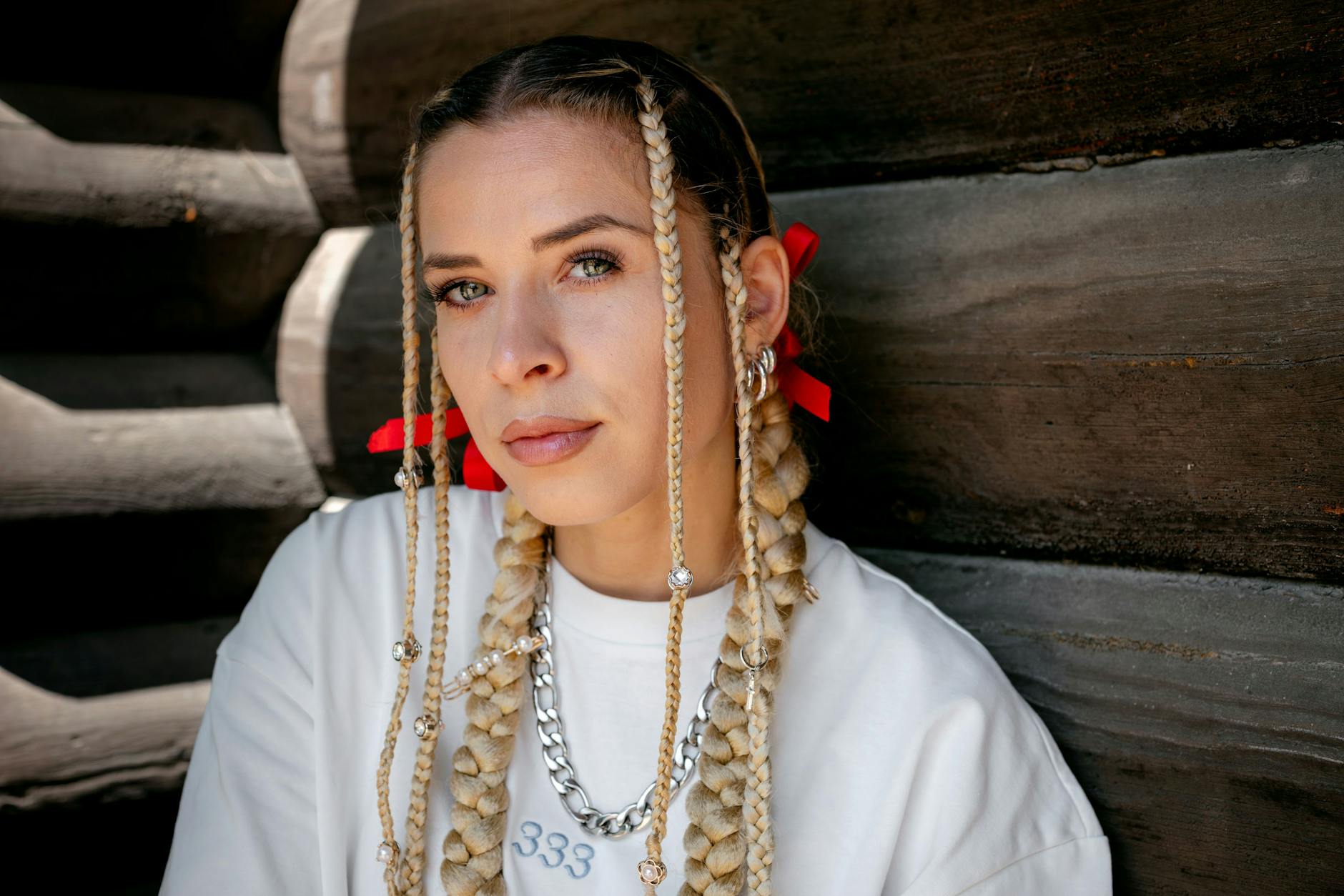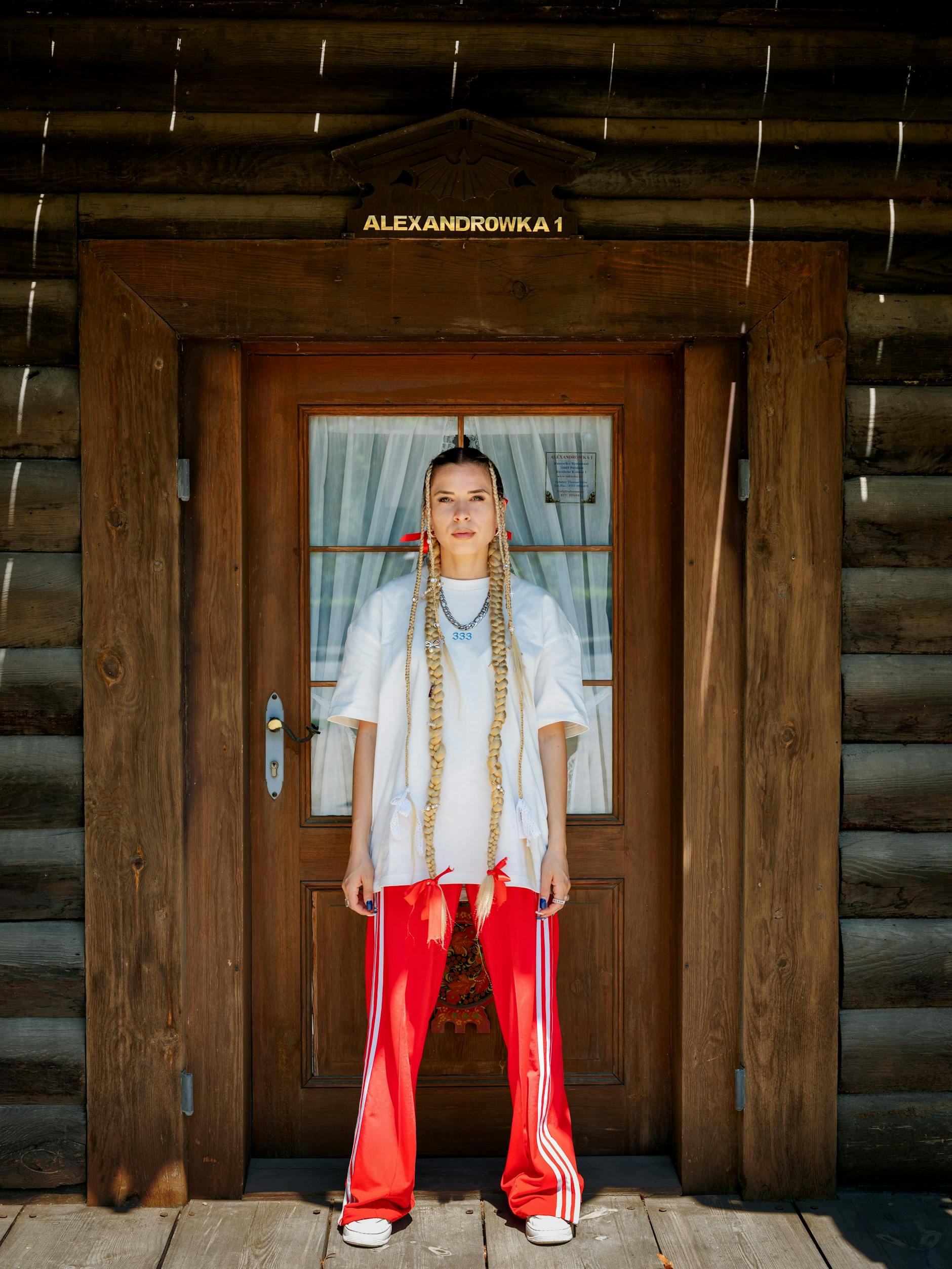Berlin rapper Zavet: “My parents taught me to say I’m not from Russia”

On her debut LP, "Etage 3," rapper Zavet reflects on her Russian-German identity. We met her in the Russian Colony in Potsdam, for tea at Alexandrowka.
Zavet is amazed during the photo shoot: "It looks like my grandmother's living room here," she says. Zavet poses confidently in front of the camera with her long, blond braids, which she has decorated with small pendants. In the corner of the room lie dolls in embroidered Slavic robes. Pictures of distant cities and colorful wooden decorations hang on the walls; Russian folk music plays from the speakers. Zavet herself suggested the meeting place. The Alexandrowka restaurant is located in the historic Russian Colony near Potsdam's city center. Outside the windows, tourists roll by on their Segways and photograph the impressive wooden houses.
"When I was here for the first time two years ago, the place completely fascinated me," Zavet recalls. "The colony is called Alexandrowka, and I was born in the village of Alexandrowskoye – I immediately felt a connection there." And she adds: "I also shot my music video for the song 'Ice Blue Lada' here." In the video, she wears a typical Eastern European costume. "I was wearing a kokoshnik in the video," she says. "I grew up with this culture as a child. It was a special moment for me to show that in the music video. My parents taught me as a child to say that I'm not from Russia , but that I'm German, for fear of racism. Now, as an adult, I no longer want to hide my origins." She orders the cold soup okroshka, vareniki with cherry filling, and cold samovar tea – a piece of home in Potsdam.
Zavet was born on New Year's Day 1995 in the West Siberian region of Tomsk. Her parents named her Elizaveta. Two years later, they emigrated to Germany, where her name was Germanized to Elisabeth. She grew up in a village in Franconia, socialized between Russian and Bavarian culture. From an early age, she developed a passion for music and took piano lessons. "My Russian piano teacher was really strict. Today I'm grateful for that. That was my first step towards music," she remembers. Her older siblings showed her MTV and Viva, and her parents played Russian folk music for her. As a teenager, she danced hip hop and set up a studio in her bedroom.
After graduating from high school, Zavet completed an apprenticeship and then moved to Mannheim. "I no longer fit into small-town life; it felt cramped, and I couldn't develop freely. It wasn't until Mannheim that I felt freer," she recalls of this period in her life. During the pandemic, she began rapping her own featured parts on songs by artists like Shirin David and Loredana on TikTok. Then she began writing her own lyrics – and soon received an offer from a major record label. She released her first mixtape, "Husky Augen," in 2023.
Her debut album, "Etage 3," is significantly warmer and more emotional. "During the creative process, personal life situations gave me a different way of accessing my emotions," Zavet reflects on her studio work. "I was able to let my emotions run free. I think you can hear that." The album's ten tracks feel like a liberating journey through various emotions and stages of life. "It's not just about identity, but also about breakups, pain, classic heartbreak, new beginnings, and healing," she explains.
Already on the first song, "Paradise," she addresses past traumas and asks, "Who will catch me if I fall?" Her voice is particularly impressive, alternating between singing and spoken word, sounding both vulnerable and powerful. The trap beats are harmonious, effervescent in the right places and then restrained again. The theme of home and home plays a recurring role in her songs. Almost two years ago, Zavet moved to Berlin, into the third floor of an apartment in an old building in Friedenau. She dedicates the title track, "Etage 3," to her apartment. In it, she raps impressively: "I don't know where I fit in yet / Only that it's not this city." Is she referring to Berlin? "I relate that line to my old small town," she says. But even though she's settled in Berlin and has a stable environment here, she also feels a restlessness within herself. "I think you never know where you'll end up. I love Berlin, but I don't know how long I'll stay here."

On what is arguably the strongest song on the album, Zavet addresses her experience of migration. "At home I am German/ Here the fatherland is disappointed/ Tell me, where am I actually at home?" she raps on "Zuhause." Her family's stories and her own experiences of discrimination inspired her to write the title. "My mother is a geriatric nurse and has a dialect. She's worked here for 30 years and has never complained. In Russia she is completely German, here her patients demand a German nurse," says Zavet. In the song, she accompanies the beats with the Russian accordion bayan. What do her parents think of her music and her musical connection to Russia? "At first they asked me why I wrote such sad songs. With songs like "Zuhause" and "Eisblauer Lada" they told me they felt the same way. That was a shocking moment for me, realizing that I was a mouthpiece for the generation before me," she says.
Now her parents should be even prouder: On the album, she raps in Russian for the first time. In "Ohne Dich - без тебя," she sings over driving beats and distorted autotune in the intro. The song is about a painful breakup and the feeling of finally being able to breathe again. "I wanted to make a song that was both profound and danceable," she explains. "I found the lyrics even more emotional in Russian."
Even though the album is primarily characterized by thoughtful lines, there are also lighter and liberated moments. "And I come in Timbos, baggy jeans, walk through West Berlin/ Color the sky apricot/ Colorful bills, jelly beans, house in Beverly/ White, I'll live there someday," she raps in "Apricot" over guitar riffs and rousing beats. "I capture my dreams in the song," says Zavet. "What I dream of is making a long-term living from music, playing at the biggest festivals in Germany, and triggering something in people."
She's already achieved at least one of these: "Etage 3" is an album that's both deeply moving and touching. The soulful songs, which range from rap to pop, reflect the development Zavet has undergone through her self-reflection on identity, home, and relationships. Although the songs are very personal, many listeners will be able to empathize with her songs—whether they have experience of migration or not.

After almost two hours at Alexandrowka, we leave. "I want to show you my music," Zavet says to the waitress, who seems about the same age as Zavet's parents. Zavet shows her excerpts from her songs and music videos. The woman is visibly impressed and asks where she can see her live. "I'll be playing at the Fête de la Musique at the Planetarium in Berlin soon," Zavet recommends. Then she has to head to the studio, where she's already working on new songs. Today, as an exception, she's recording in Potsdam.
Zavet: Floor 3. Downbeat/Warner, 2025; Concerts: June 21st Zeiss Large Planetarium , Fête de la Musique; 27.6. YSY Bar .
Berliner-zeitung





